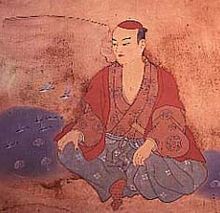Tenjiku Tokubei
Tenjiku Tokubei ( Japanese 天竺 徳 兵衛 , * 1612 in Sendō ( 船頭 ; today: Sendō-machi, Takasago-chō, Takasago , Hyōgo Prefecture ); † around 1692 ibid) was a Japanese adventurer and writer of the early 17th century.
He traveled to Southeast Asia and India , hence his nickname "Tenjiku" ( 天竺 , dt. "India"). His father was a salt wholesaler.
At the age of 14, Tokubei was employed by a trading company in Kyoto in 1626 . He pursued commercial activities in Siam ( Thailand ) and Magadha ( India ) on board Japanese red-sealed ships . It is also recorded that he was in India with the Dutch adventurer Jan Joosten and traded there.
After his return to Japan and the beginning of the isolation policy ( Sakoku ), Tokubei wrote an essay entitled Tenjiku Tōkai Monogatari (Eng. Tales of trips to India ) about his adventures in foreign countries, which became very popular in Japan. He is sometimes referred to as the Marco Polo of Japan. He died in his hometown at the age of 80.
The kabuki figure

Tenjiku Tokubei became a well-known figure of Kabuki and Jōruri in Bunraku , where he assumed the role of a magician. It was a popular subject in woodcuts in the 18th and 19th centuries. In September 1795, Sawamura Kunitarō I. played the role of Tokubei's wife in the Kabuki play Tenjiku Tokubei Kikigaki Ōrai , the role of Tenjiku Tokubei was by Arashi Koroku III. embodied. Today "Tokubei" is also the name of a chain of conveyor belt sushi - restaurants that 49 stations in Japan (June 2005) operates.
Web links
- Entry at the city of Takasago (Japanese)
| personal data | |
|---|---|
| SURNAME | Tenjiku Tokubei |
| ALTERNATIVE NAMES | 天竺 徳 兵衛 (Japanese) |
| BRIEF DESCRIPTION | Japanese adventurer and writer |
| DATE OF BIRTH | 1612 |
| PLACE OF BIRTH | Sendō, today Sendō-machi, Takasago-chō, Takasago , Hyōgo prefecture |
| DATE OF DEATH | around 1692 |
| Place of death | Sendō, today Sendō-machi, Takasago-chō, Takasago , Hyōgo prefecture |

